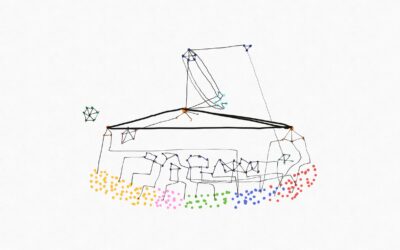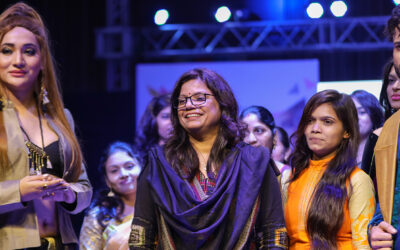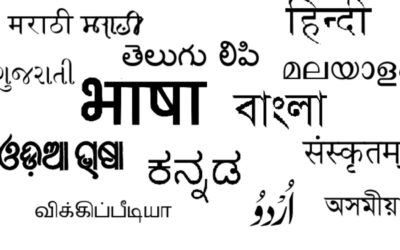There are only a few people to whom I’m really close. One of them is a classmate I know since 6 years. We met in college and graduated together. Socially, he is extremely awkward and an introvert who is fascinated by trains. I have never met him after college. In fact, even the idea of seeing him in person, makes me uncomfortable. But, over the phone, we discuss everything from tiny detail of our lives to behavioral psychology and voodoo practices. Both of us find comfort in invisibility…
The other day, I was telling him how I can be schizophrenic and he may just be a non-existent character I hallucinate about, an imaginary friend. I supported the idea with the reasoning that I haven’t seen him for so long, not even in a picture. It sounded alluring. We laughed and moved on to another irrelevant topic of discussion. Fortunately, I’m not yet diagnosed with schizophrenia but I love hallucinating. It offers me a getaway to an alternative thought – worlds within my head which allow me to be unapologetically me, to laugh without being conscious, to accommodate myself in an imaginary entity, to live without being labeled as a queer.
It has been years now, that I have come out as a queer and a survivor. Over time, I have realized that half the battle is won if you make peace with your own self. There are days I feel tired of all the self-introspection and identity validation from the outer world. I’ve stopped indulging in any conversation initiated by anyone with an illogical argument against queer individuals. Am I giving up on the battle? Another type of conversations I consciously escape are those about my childhood. It was the most traumatized phase I’ve gone through. There is no room for that little timid hopeless boy who thought he will not survive, and sank into the void of life. He has never been a part of my hallucinations either.
Since last 7 months, I’m working with children on the issue of child sexual abuse. Initially, I never anticipated that it will agitate me in any way. I thought I had learned to be detached with human emotions. For me, I was the saddest kid, who had seen it all. It started changing when I used to repeatedly come back from work, day after day, with harsh stories of abuse, sexual bullying, incest or violence. Such criminal acts have been so normalized that it doesn’t seem inappropriate to these children. Most of the kids are subjected to violence by their own people, the ones who are partially responsible for their existence, who they know and trust. These stories took me back to the dark allies of my unconscious mind where I could see the hopeless kid again.
When I was in 6th std, I used to like reciting Rabindranath Tagore’s poetry more than playing football and watching drama instead of cricket. I could spend hours making art rather than roaming around on a bicycle. All these characteristics were homo-normative and disapproved by the society. Bullying and rejection became my constant companions. With the onset of puberty, the situation became worse. I couldn’t relate to many of my peers and started to hate myself for being different. Moreover, I knew I can’t talk about this to anyone, not even to my parents.
“I am afraid, what if they blame me?”
That’s what a lot of children say. It is natural for children to share everything with their parents first but when do they stop. When do they assume that it’s ill-suited to talk about certain things to them?
In 2012, I was going to a psychologist in Kolkata to cope up with the changing circumstances around me, and to make peace with my identity. Unfortunately, that didn’t help much. Once, my dad asked me why it is easier for me to communicate with an unknown psychologist but not with them. I did not have an answer.
Now when children share their stories with me, I know why I felt more free, more in my skin, while sharing things with the psychologist. Along with trust, I had a sense of detachment with him. I knew that none of my confessions are going to scare or hurt him. On the other hand, when parents are scared, they don’t understand how to reciprocate. They want their kids to be protected from the uncertainty. They want them to be happy, the way they perceive happiness.
There has always been insensitivity and intolerance towards people belonging to alternative sexuality, especially gender-nonconforming people. They thought their hate will distance me from the idea of being different. Ironically, that distanced me from them. I knew it’s better to not talk about it. But one fine day, the impulse took over me and I decided to open the closet to freak my parents out. Yes, they freaked out, to an extent that welcomed mistrust, discrimination and apathy. I knew I was responsible for everything.
In one of the cases at workplace, a 12 year old was sexually abused by his maternal uncle. After days of self-blaming, the child decided to disclose that to his mother and guess what she did. She beat him for ‘lying’, told him to keep his mouth shut and forget the incident. Do parents ever realize what damage they do to their kids? How they craft the scars that may never heal?
Interestingly these conversations are often swept under the carpet with the larger pretext of ‘Parents do everything for the good of their child’. This generalization excludes all those who en-root their dreams to their kids, who condition their love to them, who kill, rape, sell, discriminate and who think children to be their property. It may seem like a surface level discussion with an argument of how these parents are the product of same insensitive society. For me, it is a distant dream to see a world of equality. The cohesive forces of politics, religion and money will always influence the hierarchical system of power dynamics. Will that justify the deleterious childhood?
Most of my interactions happen with children from low-income families. The financial inadequacy, poor understanding of boundaries and illiteracy brings other conflicts within families. The primary victims of their frustrations are children. Eventually, they imitate what they see, developing a similar understanding of privacy, boundaries and self-esteem. My first experience in a government school in Mumbai was daunting and the kids looked uncontrollable. The first thing I did was to stereotype all BMC students to be hopeless.
The perception changed when a colleague said, “Don’t give up on those children, a lot of people have already given up on them”.
Parenting is difficult and can be exhausting at times. But giving up is not an option in any case. Families influence the cognitive development of a child more than anything. They don’t deserve to see violence, hate or abuse while growing up. You can say things that hurt a child and contribute to their development of self-concept, but you’re not entitled to say any thing that may scar them neuro-biologically. Parents tend to control their children a lot. Examples of psychological control include not allowing them to take decisions, invading their privacy and fostering dependence. Acknowledge that you may have differences with your child but the idea is to embrace the individuality. Never tell your child they are not worthy of anything. What if they believe you?
Through my growing years, I have received a lot of hate, within and outside family. As an adolescent, my coping mechanism was to dissociate with everything and everyone.
Now in my 20s, this sense of dissociation has affected me in several ways, the most disturbing of which is lack of belonging to people and places. I’m in no contact with my school friends. I’ve never been close to my cousins or any relatives. It’s not that I don’t like them but I was always afraid of their insensitive moral policing. I often have difficulty conveying a routine instance to my family. I’m comfortable communicating with unknown people who I know I will never meet again. For example, that friend from college. This self-portrayal was accosted when my friends started coming out with their experiences of sexual abuse. I didn’t know how to react and decided to go to a psychologist in Delhi. We talked about my work, relationships and childhood by the end of which she suggested me to have an imaginary conversation with my parents and pour out all that I always wanted to. It helped. I felt at ease but more important, I realized how much I love them in-spite of all the differences.
I am neither a parent nor have any experience of nurturing a child. Clearly, it doesn’t make any sense for me to propound the idealism of parenting. But the key is to understand how your child is, and then to discover your own way of parenting. The trick is to understand where to stop and where to intervene.
It has taken time, but my parents came to terms with my identity. On some days, I feel sad for not being the best of me, for cribbing about small things, underlining my privileges and to constantly question my creative confidence. But, I have learned to condemn the idea of creating a hierarchy of individual’s struggles. My anxiety is equally bona-fied as someone’s struggle to fight cancer. For me, everyone is a survivor, and we all find our own ways of converging within the larger picture where family is a part of us. Now, I try to create a more meaningful equilibrium between my hallucinations and reality. I’ve never shied away from seeking psychological help. It has even helped me at times. Now, healing is more of a personal journey. Healing, for me, is silence, poetry, Frida Kahlo’s paintings, creating art in my diary.
Like Frida said “At the end of the day, we can endure much more than we think we can.”
With this, my heart dances and the kid within me dares to differ.
Featured Image Source: Flickr




0 Comments